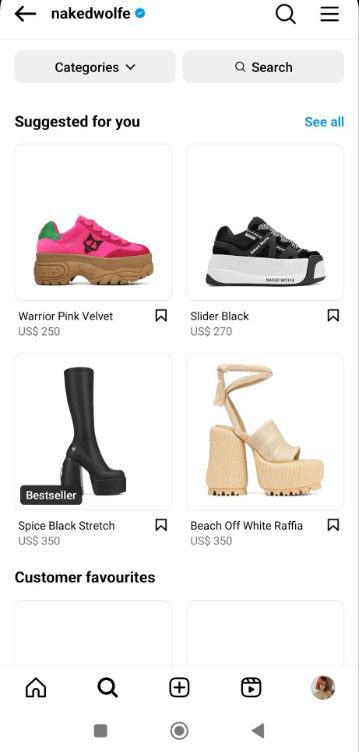An overwhelming majority of people own smartphones these days, and why wouldn’t they? Beyond their ability to make calls and send messages, smartphones are powerful multifunctional devices that offer entertainment, enhance productivity, and convenient shopping on the go from anywhere in the world. This comfort and ease of use is precisely why m-commerce is the future of online shopping.
By 2025, m-commerce sales in the United States alone are expected to reach approximately $710 billion, surpassing $431 billion in 2022. Moreover, 91% of adults shop online only with their smartphones. So, if you want a piece of the booming mobile commerce market for yourself, you can no longer afford to sit back on the latest m-commerce trends.
While having a mobile-responsive Shopify store is essential, it’s just the tip of the iceberg. We’ve compiled a list of the projected mobile shopping trends for 2024 here. Incorporate them into your business before your competitors and propel your Shopify store to new heights!
Table of Contents
- 1 Voice Commerce and Smart Assistance
- 2 Virtual and Augmented Reality
- 3 Dedicated Shopping Apps
- 4 Subscription-Based Models
- 5 Influencer Marketing and Social Commerce
- 6 Enhanced Payment Flexibility and Options
- 7 Faster Customer Service With Chatbots
- 8 Seamless Omnichannel Commerce
- 9 Data Analytics for Tailored Experiences
- 10 Inclusive, Accessible Shopping
- 11 App Integrations for a Superior Experience
- 12 Stay Ahead of M-Commerce Trends With Coalition Technologies
Voice Commerce and Smart Assistance
Smart voice assistants such as Alexa, Siri, and Google Assistant have made it faster to look up information, schedule tasks, control other electronic devices, and more. Many businesses have already seen their potential and integrated them into their mobile commerce strategy. According to PwC, more than 40% of those who use voice search do so for shopping or adding items to their lists, and this percentage is expected to increase as more people learn about its capabilities.
It’s much easier and faster to say, “Hey, Siri, which are the best vacuum cleaners for 2024?” than to type it out on your phone’s narrow keyword. Similarly, saying “reorder toilet paper” to your smart voice assistant will save you the trouble of visiting the website, looking for the product, and going through the checkout process again.
How can you hop on the voice m-commerce trends? Add long-tail keywords and conversational phrases in product titles, descriptions, and metadata.
Virtual and Augmented Reality

AR/VR has changed mobile commerce and how consumers shop online. If you can see how a sofa would look in your space or how a particular shade of lipstick would look on you, there will be no uncertainties before you hit purchase. For businesses, this means more sales and fewer returns. Many brands, such as Amazon, Ikea, and Sephora, have already integrated it into their mobile commerce strategy, and it’s time you did, too.
Industries like beauty, fashion, real estate, and home improvement are leveraging the capabilities of AR. However, even travel & tourism businesses can use this innovative mobile commerce technology.
Dedicated Shopping Apps
Surveys show that 60% of consumers prefer mobile shopping apps over mobile websites, so having a responsive design for your Shopify store will no longer cut it—you need a dedicated shopping app!
Mobile apps are faster than websites since they store data locally and offer better functionality by utilizing hardware features such as cameras and GPS and more straightforward navigation. They’re a direct channel for engaging your customers and offering them a seamless and personalized shopping experience that will have them returning. If you want to adopt this m-commerce trend, you can find many app builders on the Shopify app store to create a bespoke shopping app for your business.
Subscription-Based Models
Repeat customers spend more while promoting your business in their circles for free, which is why customer retention is a priority for most companies. The popularity of subscription-based services has transferred to e-commerce in recent years, and the trend is moving towards mobile commerce, too.
Subscription programs offer customers the convenience of having their desired products stocked up without constant reordering while also creating a steady stream of revenue for your store. Shopify supports subscription-based billing and partner tools to help you set up a subscription program customized to your needs.
Influencer Marketing and Social Commerce

Have you ever bought something because you saw it on social media? It could be a new gadget to simplify your life, a subscription service, or even a trip to a remote tropical island. According to a recent survey, 61% of Gen Zers and millennials trust social media influencers for product recommendations, so influencer marketing is a powerful mobile commerce strategy that you must incorporate into your broader social commerce efforts. Leverage influencer marketing on platforms like Facebook, Instagram, and TikTok to tap into their vast audience and use their in-built shopping capabilities to your advantage.
Enhanced Payment Flexibility and Options

Offering better payment flexibility is among the most popular m-commerce trends you’ll see being adopted in 2024. Friction at the payment stage is one of the top reasons why people abandon carts and why more and more stores have switched to one-click checkouts. If you want your mobile commerce efforts to succeed, offer digital wallets such as Apple Pay and Google Pay, afterpay options, and digital currency alongside traditional payment methods.
Faster Customer Service With Chatbots
According to Hubspot, two-thirds of buyers expect a response within 10 minutes to their customer support queries. Live chat and chatbots have emerged as two popular solutions for offering instant support. Both have their limitations; however, the advancements in artificial intelligence have made the latter a more cost-effective and efficient option for providing quick resolution. Your mobile commerce should still include both, but having an AI chatbot will significantly reduce the workload on your live customer service team.
Seamless Omnichannel Commerce
Users often go through multiple channels before purchasing on your website or app, and they expect to have a clean, consistent experience through every step of their journey. M-commerce trends in 2024 are all about creating a seamless shopping experience across various channels, including desktop, in-store, social media, and mobile commerce. Synchronize your inventory, orders, and customer data across different touchpoints with Shopify’s integrations and implement an omnichannel strategy that offers an enhanced shopping experience.
Data Analytics for Tailored Experiences
65% of customers expect businesses to adapt to their changing needs and preferences and offer a customized experience. Your competitors are always in a race to outperform you, so the only way to stand out to your customers is to create a unique shopping experience that considers their preferences.
Analytics apps such as Conversific Store and Repeat Customer on Shopify are fantastic tools for gaining deeper insights into how your customers behave, what they like, and what kind of shoppers they are. Leverage the data to tailor a memorable shopping experience by offering promotions and product recommendations based on their past behavior.
Inclusive, Accessible Shopping
Ensuring that your mobile commerce site or app is accessible to all users, including those with disabilities, is not just an m-commerce trend but a necessity for complying with legal standards, expanding your reach, and encouraging a positive brand reputation. You don’t want to be known as the brand that excludes communities with special needs. Ensure compatibility with screen readers and voice commands, add alt text to images, and simplify your Shopify store’s design to make it more accessible for mobile commerce.
App Integrations for a Superior Experience
Many new businesses make the mistake of using a cookie-cutter approach to building their store. While there’s no harm in using a basic Shopify store, it’s not a good strategy if you intend to stay in business for long. In the last few years, business owners have recognized the power of Shopify apps in transforming their store’s identity, functionality, and profitability.
You can level up your store with app integrations, from customer retention with Yotpo and AI-powered search with Syte.ai to omnichannel messaging with Infobip.
Stay Ahead of M-Commerce Trends With Coalition Technologies
Mobile commerce makes up nearly half of all e-commerce sales, which grows yearly as more people turn to their smartphones for shopping. You need to stay on top of new and emerging m-commerce trends to delight your customers because if you don’t do it, your competitors will.
At Coalition Technologies, we specialize in helping businesses maximize the potential of their Shopify stores with data-driven strategies that account for ever-evolving technology and consumer expectations. Contact us today to learn how we can transform your Shopify store into a mobile commerce powerhouse!

